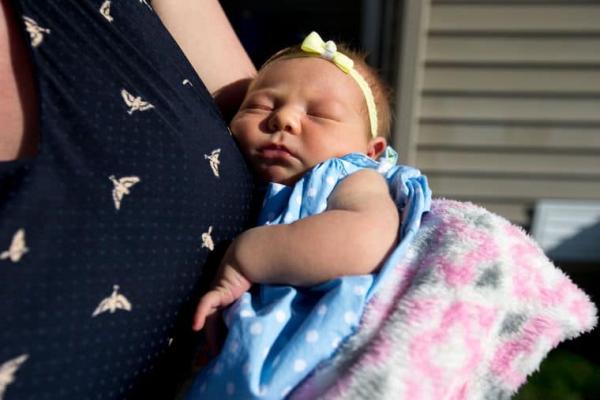
When it came to having baby girls, the Underdahl family from Post Falls, Idaho, were clear underdogs.
After 100 years, they have the baby girl they've always wanted.
The Underdahl family has had only boys for the last 101 years. That changed April 12 when Scott and Ashton Underdahl welcomed baby daughter Aurelia Marie Anne, according to The Coeur d'Alene Press, a local Idaho newspaper.
"Everyone has been hoping for a girl," Scott said, adding that the running joke of the family was they would never have a baby girl. "I didn't know what an Underdahl girl looked like."
The family has had seven different boys over four generations before Aurelia's birth. The last girl to be born was Scott Underdahl's grandmother, Bernie, in 1914.
The family said they already see the difference in raising a girl over a boy.
"She's pretty quiet, so apparently girls are different than boys in our line," Scott told The Coeur d'Alene Press.
They said Aurelia has her grandfather's nose.
"Maybe it took more than 100 years to create perfection," grandfather Conrad Underdahl said. "She's a cutie. We've been spoiling her a bit because it's just different finally holding a baby girl."
The 100-year gap without a girl in the family seems like something out of a romantic comedy movie, or a science fiction film where the girl becomes a superhero. In fact, it is out of the ordinary.
According to The Tech Museum of Innovation, the chances of having a boy or girl are often split 50-50. That makes sense from a biological standpoint. If a sperm with an X chromosome reaches the fetus, couples will have a girl. If one with a Y reaches the fetus, then it's a boy. It's down to a flip of a coin.
In the case of a family not having a girl in 100 years, part of the reason may be because people are more likely to have boys than girls. A recent Business Insider video said there are close to 10 million more boys born every year than girls.
"Most parents-to-be assume that the sex of their child comes down to a flip of the chromosomal coin, with an equal chance of having a boy or a girl," according to Business Insider. "But in reality - the odds are not even."
This isn't just because sperm with Y chromosomes are better swimmers. According to NPR, a recent study published in Proceedings of the National Academy of Sciences found there have been more boys born than girls because baby boys are less likely to die during pregnancy.
While more male embryos die during the first few weeks of pregnancy, girl embryos have a higher mortality rate throughout all three terms, NPR reported.
"That's completely opposite to what had been believed for a long time," biologist Steven Orzack at the Fresh Pond Research Institute told NPR.
Orzack said, though, overall there isn't a big difference between what gender is created at conception.
"The best estimate we have is that it's even-steven - 50 percent males [and] 50 percent females," Orzack told NPR.
Couples - who often argue about which sex they want their baby to be, although that may be changing with modern couples - have heard tales about what to do if they want to have a baby of a certain gender.
There's also been research that has found certain dietary habits can lead couples to have a baby boy or girl.
I previously wrote about a Netherlands study that found eating ice cream and other foods that are "low in potassium and sodium but high in calcium and magnesium" will help couples have baby girls.
The study, which instructed couples to go under a "gender selection plan" where they had sex a certain number of times per week while eating a strict diet, found those who ate yogurts, hard cheeses and spinach (all foods high in calcium) were more likely to have baby girls. It was similar for women who ate cashew nuts, beans and whole wheat cereals because those foods are high in magnesium.
"The results show that both diet and timing methods increase the probability of a girl - the impact of the diet being the most pronounced," a spokesperson told Daily Mail. "It shows a substantial success rate when both methods are applied correctly."
Other research has found dietary habits among men can affect the baby's sex. For example, The Telegraph reported in 2010 that eating breakfast foods, such as bacon, helps couples have a baby boy.
A similar study found obese men were more likely to have sons. The study, which looked at 8,500 couples in fertility treatments, found overweight men were more likely to have sperm that carried Y chromosomes.
In general, research has found men's genes are more likely to determine the sex of the baby, though scientists remain unsure of why.
While your grandma and friends probably have some tips to help you have a baby boy or girl, researchers are fixed on the idea that the odds are 50-50.
"I tell them it's 50-50," Dr. Richard P. Frieder told WebMD. "The reality is there is nothing you can do that really matters."

